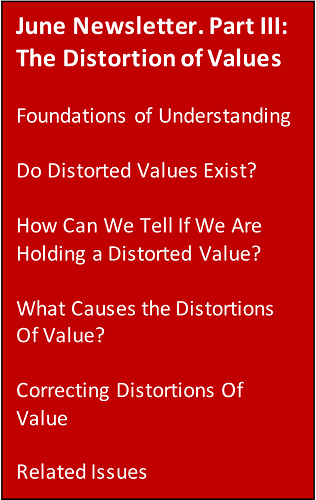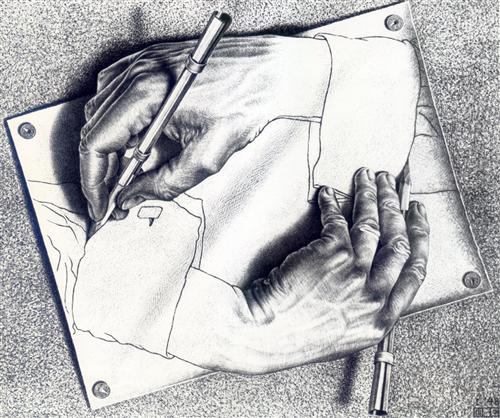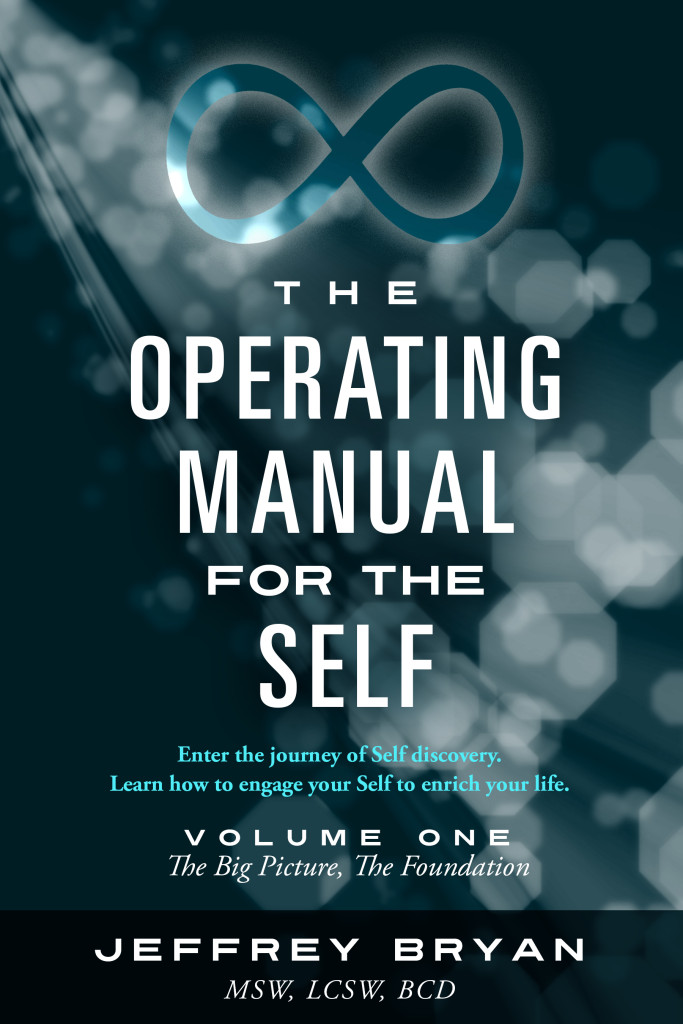 Values, Part III: The Distortion of Values Pdf version
Values, Part III: The Distortion of Values Pdf version
Do distorted values exist? In this era of increased and intense conflict (internal, interpersonal, and international) is there some benefit to answering this question? Let’s see what the benefit can be.
FOUNDATIONS OF UNDERSTANDING
There are timeless and temporal values. Timeless values are values that everyone would say they want all the time, for example: love, health, strength, freedom, beauty, fulfilling our needs, happiness, or safety. Temporal values are the values that we as human beings use as we think and act. Temporal values have a specific person, place, time, and purpose. Culture and group membership also influence the choice of a persons temporal values. An example of person, place and purpose: “Since I value the safety of my children, I value the crossing guard at the corner of the street. She/he helps my children cross the street safely. Timeless values exit without specific reference to person, place, time, purpose, culture or group membership.
Point of Empowerment: Timeless values give you the knowledge, conviction, and certainty that your point of view is right. And, give you the strength and determination to act on your values.
To make meaningful statements about timeless values, they need to be made into temporal values–be made personal for us.
- “I need the strength to tell my spouse that I am unhappy when he or she yells at me.”
- “Since I value freedom I will create more than one choice for myself in any given situation. That way I will have the freedom choose.”
Putting timeless values into action also makes them meaningful to us.
- “I value joy so I will listen to the music that brings me joy.”
Another dimension of values is absolute values and relative values. We could say that timeless values are absolute values, and temporal values are relative values. Words that describes absolute values are: transcendent, perfect, pure, eternal, divine, abstract, and objective. Absolute values are not experienced directly in our daily lives but exist in the realm of ideas, as aspects of life itself. Words that describe relative values are: practical, empirical, pragmatic, subjective, human, and imperfect.
There is the saying, “One person’s terrorist is another person’s freedom fighter.” (Terrorism-the extreme use of violence that injures “non-combatants”, “innocent bystanders”.) This statement reflects the value of freedom. And, it points to a relativistic world view, that our perspective (our point of view) determines our beliefs and values about right and wrong. Is terrorism “wrong” (immoral, unethical)? Well, it depends on your point of view.
We could say that terrorism is wrong, no matter who uses it or when. This points to an absolute (non-relative) valuing of the sanctity of life. Freedom is a value, but so is the sanctity of life. Which view is correct, the absolute or relative definition of value? This is actually a philosophical debate that is hundreds of years old. Our assertion is that both views are valid as there are two different kinds of values. This distinction becomes important when we consider the distortion of value.
ABILITY OF THE MONTH: TO DISCERN VALUE
In discernment, we use our mental abilities to think and to analyze, as well as our emotional ability to determine what feels right to us. Utilizing the skill of discernment, we make the distinctions that add to our knowledge of what our values are.

In the Era of Empowerment, we can consciously create ourselves and consciously choose our values.
DO DISTORTED VALUES EXIST?
As we live our life, think about the various issues in our life, and make choices for our life, we are always applying our values. (See April and May newsletters to understand why this is true.) As we apply our values and act on our values, are we sometimes acting on distorted values? What is a distortion? Distortions are misperceptions of something. A misperception is: mistaken, confused, unclear, inaccurate, and potentially destructive. Regarding values, our distortions are misperceptions of timeless values. And, our misperceptions are compounded as we put timeless values into practice making them temporal values.
The words that describe misperceptions also describe distorted values: mistaken, confused, unclear, inaccurate, and potentially destructive. Other characteristics of distorted values are:
- Limited, keeping a value from what it could be: “I value love but know I stop myself from receiving love because love scares me.”
- Exclusive, the value applies to me (and my group) and not others: “I value fun and enjoy my exclusive club because it keeps the “undesirables” out.”
- Compromised, only partially expressing a timeless value: “I value strength but my strength is limited because I only act out of fear and not from strength.”
- Ignorant, not understanding or refusing to understand, the meaning and use of a value: “I value knowledge but I know enough and I know that I am right.”
- Selfish, “What is of value should only be for me.”
- Self-centered, “Since I am the most important person around, what I value is the most important value around.”
- Destructive, values that hurt and damage others: “I value money and I want as much money as I can make. It does not matter who is hurt or damaged in the process.”
Point of Empowerment: The consequence of having distorted values are pain and limitation, pain for oneself and others, and limitations on what our life could be.
Point of Empowerment: Extremely distorted values provide a distorted strength based on fanaticism and hate. If fanaticism and hate are your sources of strength and determination, your values are distorted.
Practice: Seek to identify and correct the distortions of your values.
HOW CAN WE TELL IF WE ARE HOLDING A DISTORTED VALUE?
Each person, and only that person, can decide for himself/herself, if a value they hold is distorted. To consider and answer the question, “Do I have distorted values?” we need humility; the kind of humility that says, “I could be wrong. I could be making a mistake.” Life will show you where your distorted values are through some form of pain: painful feelings and painful circumstances in your life (physical/body pain, emotional pain, and social pain-excessive conflict with others). We then need courage to take the next step, to correct the distorted value.
Other ways to tell if you are holding distorted values:
- Evaluate the results of your actions as you put your values into action. Consider these questions:
- Are you getting the results you want with the actions you take?
- How do others react to your behavior? Are they overly compliant and agreeable, or are they over rebellious and disagreeable?
- Take the words that describe distortions and distorted values, and apply them to your value. For example: “Does limited describe my value?” “Does selfish describe my value?”
- Use timeless values as a frame of reference to compare your temporal value to. “I seek (value) safely and value freedom. I want the freedom to carry my gun anywhere I want so I can feel safe. How does my temporal value of freedom compare to the timeless value of freedom?” You can also ask, “Does my safety compromise the safety of others?” “Is my desire for this freedom distorted because it is exclusive, compromised, and potentially damaging to others?” (A person could say, “Yes my value is distorted but I don’t care. I am so afraid and have so much fear, the only way I can feel safe is if I have a gun with me.)
- Compare the values you hold with the values others hold. Ask for their opinions. “Do you think my valuing exercise four hours a day is distorted? How long do you exercise each day?” (Don’t ask the person you see at the gym every day who exercises the same amount of time you do.)
WHAT CAUSES THE DISTORTIONS OF VALUE?
The values we hold are related to the kind of person we are, to the Self that we have. Distortions of our Self cause distortions of our values. Also, disturbances of our Self cause us to have limited abilities, the abilities we need to fully function in creating and determining what our values will be. Examples of these distortions, disturbances, and limitations of the Self are:
- You are confused about what you truly value and can’t see the distortions of your values or your value conflicts, and the pain your distortions and conflicts cause.
- Unwillingness to be self-aware or to introspect
- Consistently acting impulsively without thinking; thoughtlessness
- Lack of humility and courage
- Overwhelming fear
- Feeling not good enough, which gives rise to, “I never have enough. I am greedy as a result.”
- Limited ability to perceive and therefore misperceive. This causes confusion about what timeless values are.
- Self-centeredness or selfishness: a person sees only the small, limited picture of a situation. This person cannot perceive truly timeless values.
- General immaturity which reduces the overall functioning an adult.
- Defects of the conscience. This causes an inability to make evaluations of ethical and moral issues.
CORRECTING DISTORTIONS OF VALUE
If we have the humility and courage necessary to see and correct our distorted values, we can take the next step. To correct our distorted values we: identify the value, recognize the distortion, and use the value changing process of changing beliefs. (See Changing Our Values in the May 2017 newsletter.)
Why do people refuse to correct their distortions? Why do we resist changing our values? There are many reasons. Some of these reasons are related to why a person choses to hold certain values in the first place. For example, “I identify myself as a Republican or Democrat (or any political or religious group) and hold the values espoused by this group of people. My identity is fixed and I refuse to consider changing my values.”
If a person’s values are challenged as distorted, and he does not want to change them, he can justify the distortions by saying, “It is all relative anyway. What each person believes is their truth. This is my truth.” Another way to avoid changing your values is to make your personal truth a universal truth. “Everyone in this country believes that our country comes first and that the rest of the world comes second, so why should I change.”
Point of Empowerment: To correct your distortions of value and to enrich your values in general, seek to infuse your temporal values with timeless values.
Practice: One way to do this is to state an affirmation before going to sleep; for example say, “I now add timeless freedom to my temporal value of freedom.” In the days that follow look for evidence that this has occurred. You may find that a limitation you had drops away resulting in more freedom.
Try the affirmation: “My guilt at saying no is lessened. I can say no to my boss’s unrealistic expectations.”
RELATED ISSUES FOR FURTHER INVESTIGATION:
- Values and self-esteem
- Values and the conscience
- How do we choose our values? How is our choice of values related to our identity and self-image?
- Values, ethics and morality: for example, consider these questions. Do the ends justify the means? Is killing justified in the defense of freedom? Which freedoms justify killing?
- What is it about being human that distorts timeless values as we make them into temporal values?
- What is the relationship between our values and the strategies we use to fulfill our needs?
- What criteria should we use to choose our values?
- What are our exact distortions of timeless values? For example: greed distorts abundance.
- What kinds of problems are created by distorted values?
- How can we use distortions of value to identify distortions of our self? For example, what do our distortions of value tell us about our character flaws and the limitations of our abilities?
- What is the relationship between our values and our integrity? Do we over value other people’s opinions?
- Should there be limits to individual freedoms when they conflict with the wellbeing of others?
IN CONCLUSION
We have covered a lot of material in our discussion of value. We can see that this a crucial and complex issue. If we work with our values we can enrich our lives in so many ways as an individual. This work will also help us participate in productive ways as citizens of the earth in the 21st century. Having value clarification discussions with others (interpersonal and international) is a way of resolving serious and damaging conflict, which benefits everyone.
 This is the Era of Empowerment because
This is the Era of Empowerment because
The Operating Manual for the Self shows you how to be whoever you want to be,
and how to do and have, whatever you can create for yourself.
Let’s unite in developing our human potential. Share this newsletter with others. Please visit our website, IIFSD.org. We invite you to participate, (as suggested in the Participation Menu selection). When you buy The Operating Manual for the Self (manualfortheself.com), you support our vision and mission. When you read The Operating Manual for the Self, you leap forward in your personal self-development and evolution. Copywrite IIFSD.org, 2017. All rights reserved.
